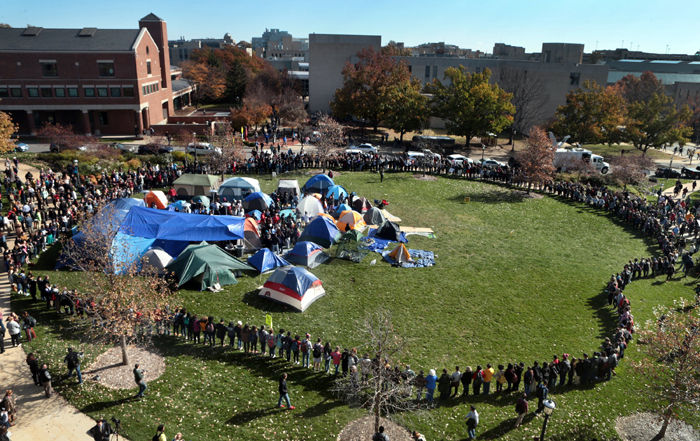Ignoring power, respect
Student protests are significant contributions to the collegiate environment and should be observed with respect.
November 19, 2015
Student protesters from WakeUp WSU and the Black Student Union held a peaceful demonstration Monday in the CUB to show solidarity with the University of Missouri.
The demonstration went well, but social media told a different story.
On the anonymous app Yik Yak, the following messages were posted during the demonstration:
“Get the hell out of the cub stupid ass protestors.”
“Tired of whites oppressing you in the US? Go to Nigeria and see how much Boco Haram thinks black lives matter.”
“You guys feel like history treated you bad, yeah it treated us all bad. Stop. Seriously.”
A variety of other racist comments were posted on the site ranging in severity from ridiculing the students and the protesters at the University of Missouri, to spreading stereotypes about Black and African-American people.
WakeUp WSU was not available for comment, but from the content of the messages, it was made readily apparent that the majority of students do not understand the significance of the stance these student protesters took, nor the importance of what is happening at the University of Missouri.
Political student protesters hold a place in history as those who observed what was happening at their universities, colleges and country with an educated eye, and stood up for what they believed was right.
Yes, students have discernible degrees of privilege by being able to attend an institution of higher education, but that does not erase their right to raise their voices in the light of wrongdoing – regardless of where that may arise.
Student protesters keep our schools accountable for their actions, whether they be politically or otherwise motivated, and serve to better their communities.
One of the most significant contributions student protests have brought to American universities is the department of comparative ethnic studies.
According to the department of ethnic studies at the University of California at Berkeley’s website, “in 1969 in the midst of national and global decolonial uprisings, the Department emerged from student and community members’ demands for scholarly programs that focused on the understudied histories and situations of African Americans, Asian Americans, Chicanos, and Native Americans.”
American student protests at our colleges hold significant power – the visibility the protesters on our campus alone have garnered attests to that. The students on our college campuses are the leaders of tomorrow – corny as it is, it is true – and it is about time we listen instead of ridiculing them from behind our phones.
Furthermore, the power of the student protester is acknowledged beyond the college campus: “more—and more visible—protests on college campuses can be read as evidence that the protesters are increasingly hopeful that they can have an effect, and that the system in which they live, no matter what they think of it at the moment, is capable of progress in the direction they desire,” according to TIME magazine.
It is disappointing to see WSU students specifically rejecting a movement that calls for improvement in the lives of Black and African-American people. History may have “treated us all bad,” but history reveals the specific marginalization, systematic murder and rape, and erasure of this specific sociopolitical group.
Most of you would not know about the Black and African-American veterans who were lynched after World Wars I and II, or about Saartjie Baartman, Claudette Colvin, the Black and African-American suffragettes, or the hundreds of other Black and African-American people who shaped our history, because Black and African-American history is an elective.
But you have a chance to engage in that history because a piece of it is right here on our campus.
Don’t miss it.
Sophia Stephens is a senior English literature and comparative ethnic studies major from Wenatchee. She can be contacted at 335-2290 or by [email protected]. The opinions expressed in this column are not necessarily those of the staff of The Daily Evergreen or those of the Office of Student Media.



















